Which machine is best for beginner tattoo artists?

Starting your tattoo journey with the right tools is essential. For beginners serious about becoming professionals, the first tattoo machine should be more than functional—it should be foundational. This guide walks you through how to choose a beginner tattoo machine that offers premium quality, ergonomic comfort, and room to grow into expert-level work.
Let’s break down what truly matters when investing in your first tattoo machine—so you can start your career with confidence, not compromise.
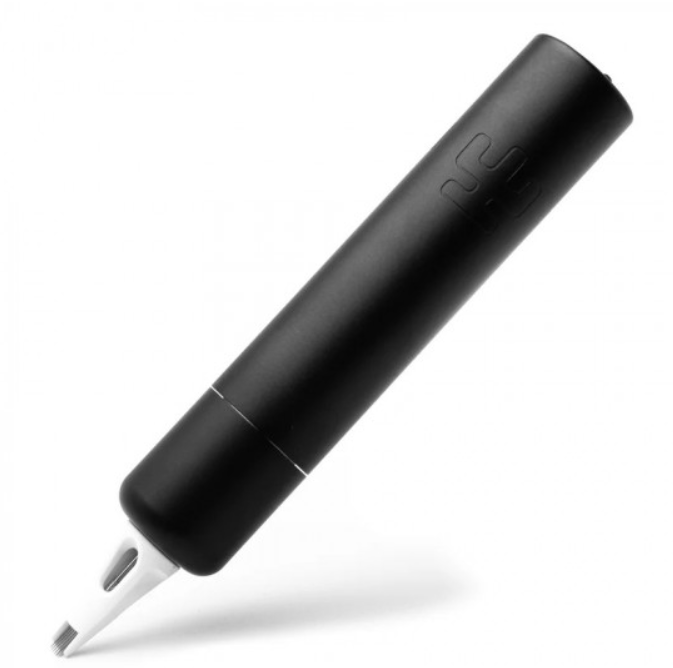
Why Choosing the Right Tattoo Machine Matters
Your first tattoo machine shapes how you learn, work, and grow as an artist. A premium tool helps you focus on technique—not on troubleshooting.
Start Strong, Not Cheap
Inexpensive machines may seem tempting, but they often lead to:
- Inconsistent lines
- Overworked skin
Wasted time on adjustments and repairs
What You Need Instead:
A professional-grade beginner machine offers:
- Smooth, stable performance
- Reliable power and stroke control
Less vibration and better comfort
Why It Pays Off:
You build clean habits, confidence, and better results—right from the start.
Instead of upgrading after a few months, you grow into your machine and stay focused on tattooing, not replacing gear.
The right machine isn’t a shortcut. It’s a foundation.
Types of Tattoo Machines: What’s Best for a Beginner?
Understanding the three main types of tattoo machines will help you make a confident, future-proof decision.
Rotary & Pen-Style Machines: Best for Beginners
Rotary machines use a quiet motor to move the needle smoothly and consistently. They’re lightweight, low-maintenance, and compatible with modern cartridges—ideal for mastering linework and shading with minimal setup.
Pen-style machines are a subtype of rotary, shaped like a marker or stylus. Their intuitive form and balanced weight make them the easiest machines to learn on—especially for artists coming from a drawing background. Many also come wireless with built-in displays and voltage control.
Bottom line: Rotary and pen-style machines are the go-to choice for beginner artists who want simplicity, comfort, and modern functionality.
Coil Machines: Better Left for Later
While coil machines offer raw power and full mechanical control, they come with a steep learning curve. They require tuning, are heavier, and less compatible with cartridge systems—making them more suited for experienced artists or supervised apprenticeships.
For beginners learning solo or in modern studios, coil machines are not the most practical choice.
Key Factors to Consider Before Buying a Tattoo Machine
Choosing your first tattoo machine isn't about hype or copying others—it's about finding a tool that supports your learning curve and sets you up for long-term success. Here are four key things to keep in mind:
1. Comfort, Noise & Build Quality
You'll be practicing for hours—so your machine should feel natural in your hand. Lightweight, well-balanced models with minimal vibration help reduce fatigue and increase precision. Pen-style and rotary machines are ideal for this, offering quiet, smooth operation that keeps both artist and client relaxed.
2. Wireless vs. Wired
Wireless tattoo machines give beginners freedom of movement and cleaner setups, especially for home or mobile use. Though they cost more and require battery management, they simplify practice and reduce distractions. Most modern machines support both wireless packs or RCA cables for flexibility.
3. Stroke Range & Motor Stability
Look for machines with a stable motor and adjustable stroke (around 3.0–4.0 mm) to handle both lining and shading. This allows you to experiment with different techniques without switching tools. Consistent voltage and smooth needle movement are essential for building muscle memory and clean results.
4. Cartridge Compatibility & Brand Trust
Your machine should support standard cartridge needles for hygiene and quick needle swaps. Stick with trusted brands that offer warranty, training content, and long-term support—you’ll save time, money, and stress in the long run.
A great tattoo machine doesn’t just help you start—it helps you grow.
Best Tattoo Machines for Beginners in 2025
If you're a beginner who doesn’t want to waste time on low-quality gear or temporary solutions, starting with the right machine is essential. At Vlad Blad, we design equipment that balances ease of use, professional-grade reliability, and long-term performance—even for first-time tattoo artists.
Whether you’re just entering the industry or stepping up your apprenticeship, the machines below are trusted by seasoned professionals and built to grow with you.
Each model is selected based on:
- Comfortable ergonomics for long learning sessions
- Clean, stable hit for consistent lines and shading
- Compatibility with modern cartridge systems
- Reduced vibration and optimized balance
- Engineering that supports both beginners and long-term development
Here are three premium beginner-ready machines to start your career strong:
Ultron 3 Max
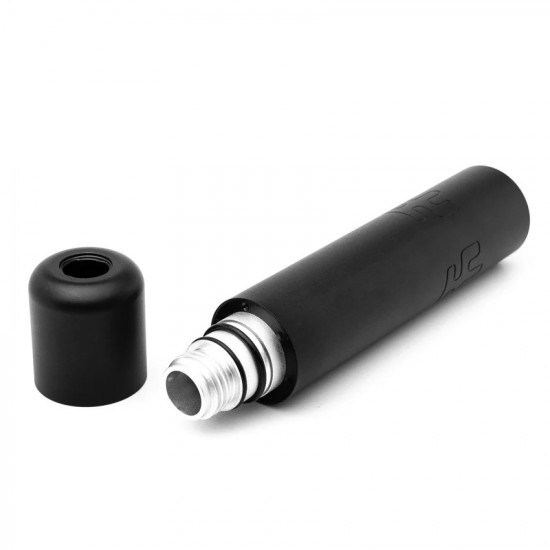
The Ultron 3 Max is the perfect tattoo machine for beginners who want the most advanced technology with minimal setup. It’s a wireless, intelligent pen-style machine that delivers professional-level performance with beginner-level comfort and usability.
- Stroke presets: Three adjustable cams (3.2mm, 3.7mm, 4.2mm) for lining, shading, and packing
- Smart battery system: Includes 2 batteries with up to 9 hours of operation each
- Display: Integrated screen with voltage control and intuitive navigation
- Motor: Custom-built brushless motor, optimized for soft but confident skin interaction
- Vibration: Exceptionally low for precise control
Why it’s great for beginners:
It’s plug-and-play. No foot pedals, no wires, no stress—just charge it, set your voltage, and tattoo. Ideal for those who want to focus on technique, not tech.
Avenger 2 Pro
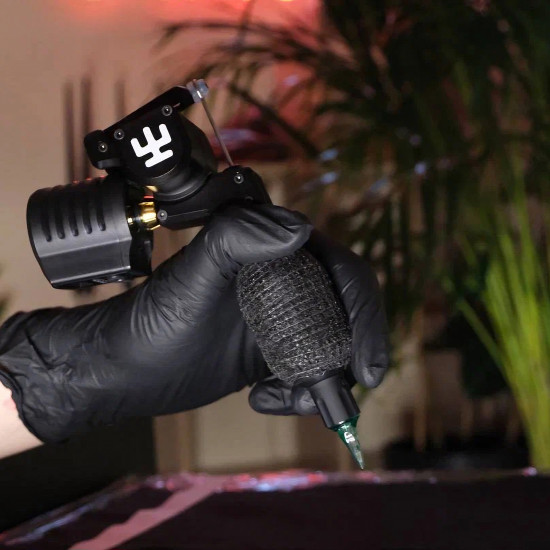
The Avenger 2 Pro is a modern classic—lightweight, versatile, and engineered for clean, stable performance across all styles. With a direct drive system and ultra-smooth feedback, it gives beginners a professional feel right out of the box.
- Weight: only 78 grams—reduces hand fatigue
- Compatibility: RCA connection and universal cartridge grip ready
- Stroke: tuned for all-purpose use—lining, shading, and colorDesign: ergonomic body with clean balance and vibration control
- Durability: built with aircraft-grade aluminum and tested under studio conditions
Why it’s great for beginners:
It’s forgiving, responsive, and reliable—perfect for learning control, precision, and needle depth without unpredictable behavior.
Ultron 2 Money Maker
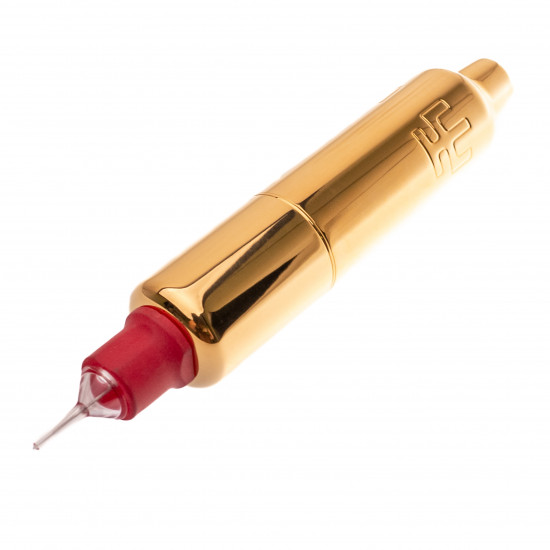
The Ultron 2 Money Maker lives up to its name: this is a powerful, universal pen-style machine that’s ideal for beginners planning to tattoo professionally. Its smooth drive and adjustable settings let you experiment and refine your skills across multiple styles.
- Stroke: fixed 3.7mm stroke—versatile for lines, shades, and fills
- Motor: durable and silent motor for fatigue-free sessions
- Grip: comfortable shape designed for steady hand positioning
- Vibration: minimal, even at higher voltagesSetup: RCA-ready, easy to maintain and clean
Why it’s great for beginners:
It’s simple, straightforward, and professional. This machine is built to help you learn quickly and tattoo confidently—without needing to upgrade six months later.
Each of these machines gives you a reliable platform to build skills, develop confidence, and deliver quality results from your very first session. Whether you prefer wireless freedom or wired precision, there’s a perfect match for your artistic journey.
The Cons: Why Most Starter Kits Fall Short
While appealing, most starter tattoo kits are not built with longevity in mind.
Here’s why premium-focused shops often discourage complete beginner kits:
- Low-quality machines: Many kits include machines with poor motor consistency and unstable stroke behavior.
- Generic components: Cheap inks, low-grade cartridges, and unreliable power units can negatively affect your results and your learning curve.
- No upgradability: Starter kits are built to be disposable—not scalable. If you upgrade the machine, you'll likely need to replace most of the kit.
If you're looking for the best tattoo machine to learn on and actually keep using as you grow, investing in individual high-quality components is the better route.
Common Beginner Mistakes to Avoid
Your first tattoo machine can launch your career—or slow it down. Avoid these three common pitfalls that many new artists make:
1. Chasing Price Instead of Quality
Buying a cheap machine may seem smart at first, but it often results in:
- Inconsistent lines
- Frequent malfunctions
- A need to upgrade within months
Investing in a high-quality, beginner-friendly machine from the start saves time, money, and frustration.
2. Ignoring Ergonomics
If your machine is too heavy, unbalanced, or uncomfortable, it will affect your control and endurance.
Choose a lightweight, well-balanced device with minimal vibration to practice longer and with more precision.
3. Skipping Proper Practice
Jumping into skin too soon without training on fake skin leads to poor results and bad habits.
Practice on synthetic skin first to master needle depth, speed, and voltage before working on clients.
A good machine won’t fix bad habits—build strong fundamentals first.
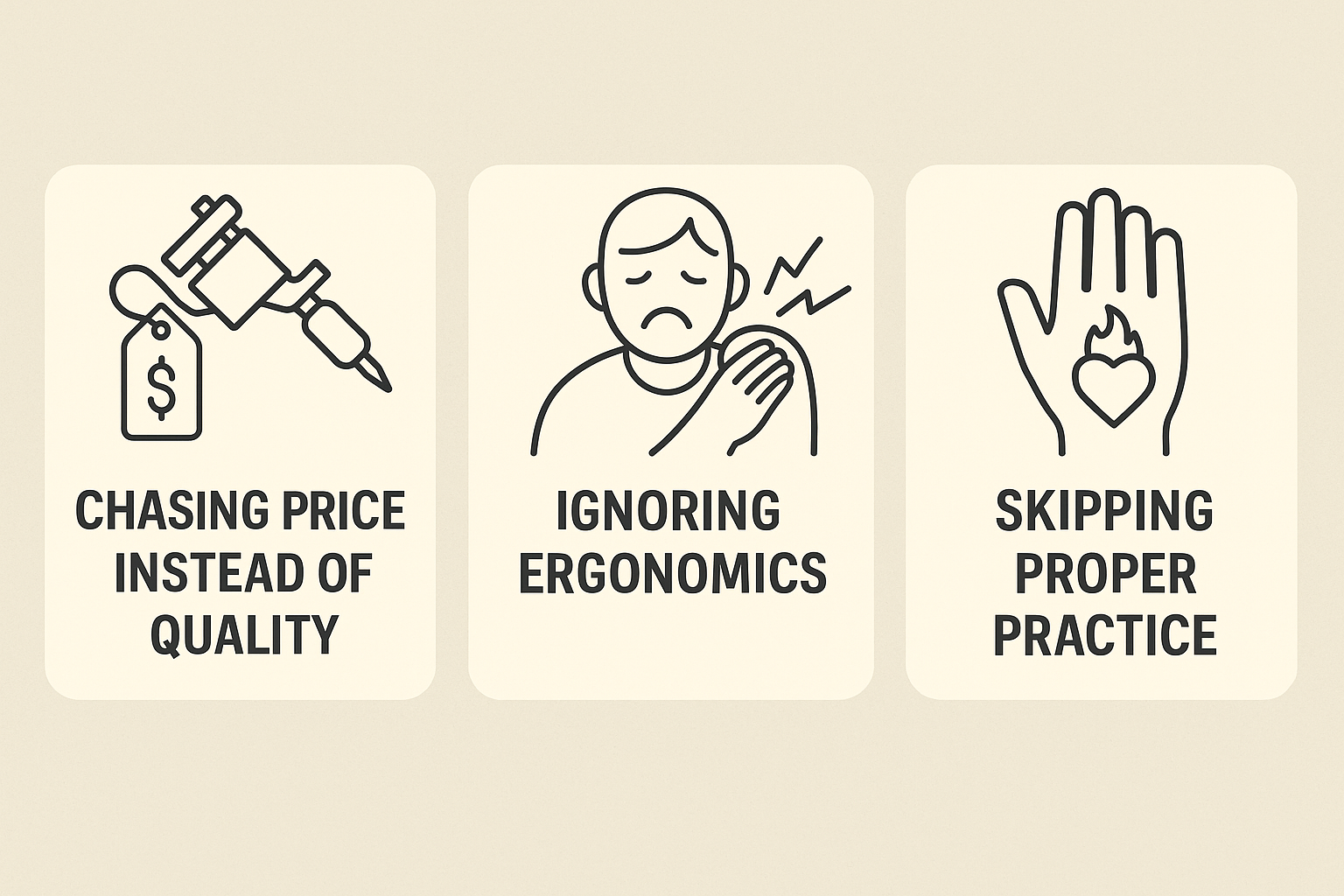
How to Choose the Right Tattoo Machine
Choosing your first tattoo machine is more than a technical decision—it’s about finding a tool that matches your background, goals, and style. Here’s how to make the right choice from the start:
1. Match the Machine to Your Artistic Background
If you come from sketching, painting, or digital illustration, a pen-style machine will feel the most natural. Its grip and motion resemble a drawing tool, helping you transition smoothly into tattooing. Rotary and pen machines are widely regarded as the easiest for beginners to handle.
2. Pick a Machine You Can Grow With
Avoid “disposable” entry-level tools. Look for machines that offer:
- Interchangeable stroke cams or adaptable stroke length
- Compatibility with professional cartridge needles
- Stability across lining, shading, and color packing
The right machine won’t just help you start—it will stay with you as your skills evolve.
3. Go Wireless for Simplicity
Wireless machines eliminate foot pedals, clip cords, and bulky power supplies. For many beginners, that means:
- Less clutter during setup
- More freedom of movement
- A cleaner focus on technique
Just make sure to choose a wireless system from a reputable brand to avoid underpowered batteries or unstable voltage.
4. Assemble Your Setup Piece by Piece
Instead of buying a generic starter kit, build your own setup with:
- A premium machine that fits your needs
- Trusted, skin-safe ink
- A quality power supply (if not using wireless)
This approach gives you full control and helps you understand your equipment—a key skill for every serious artist.
5. Learn from Artist Experience
Before buying, check:
- Real reviews and hands-on videos from working professionals
- Community threads (e.g., Reddit or YouTube) discussing beginner-friendly machines
- Feedback on long-term durability and performance
The best machine is the one that feels right in your hand, supports your goals, and delivers consistently—right out of the box.
Start Strong with the Right Tattoo Machine
Your first tattoo machine isn’t just a purchase—it’s an investment in your craft. The right tool helps you learn faster, build clean habits, and gain confidence from the very beginning.
If you’re serious about becoming a tattoo artist, skip the gear that holds you back. Instead, choose one of our top beginner machines built to deliver:
- Professional-grade performance
- Beginner-friendly ergonomics
- Long-term reliability you can grow with
Whether you choose a rotary or pen-style machine, wired or wireless, the most important thing is that it supports your technique, development, and artistic ambition.
Don’t settle for shortcuts. Choose tools that elevate your skills—and your future.
Want to avoid common mistakes and start with clarity?
Check out our full guide: Tattoo Tips for Beginners

Leave a Comment